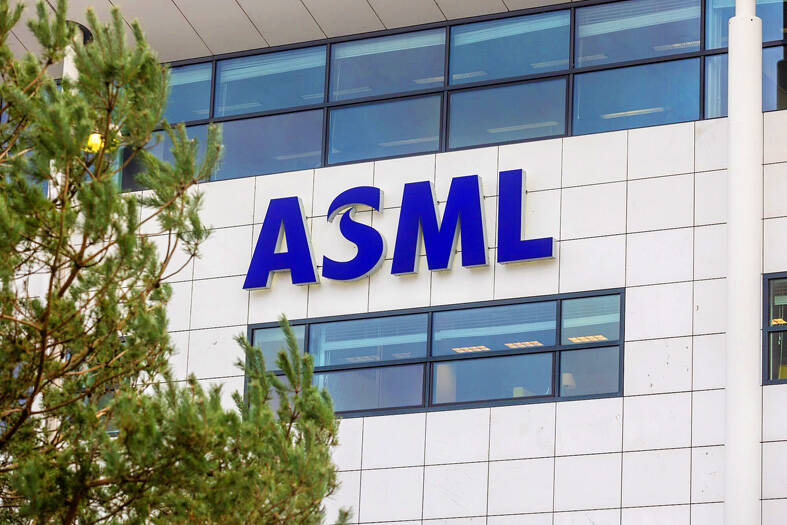Bloomberg
The outgoing Dutch government has set up a task force codenamed “Beethoven” to keep Europe’s most valuable technology company from expanding outside of the Netherlands, as concerns mount about the country’s business climate.
Veldhoven-based ASML Holding NV has told the Cabinet it’s concerned about being able to operate successfully in the country, according to government officials familiar with the matter who asked not to be identified because the information is not public.

Photo: Peter Boer, Bloomberg
ASML, which produces the world’s most sophisticated lithography machines that are used to produce chips, declined to comment. A government spokesperson said the Cabinet has regular contact with companies about the interests of Dutch society, the economy and employment.
The task force will seek to address ASML’s concerns about issues including its ability to attract expatriate workers, rising grid congestion and curbs on nitrogen emissions, the people said.
It was formed after ASML presented a number of requests to the outgoing Cabinet and said it was considering expansion abroad, according to a report by De Telegraaf earlier yesterday.
The Netherlands has lost two of its largest companies due to issues with the tax regime in recent years. Consumer goods behemoth Unilever PLC and oil giant Shell PLC relocated their headquarters to the UK. The government said Shell’s decision in 2021 left it “unpleasantly surprised.”
The concern that ASML could look abroad for expansion comes after last year’s surprise victory of far-right politician Geert Wilders’ Freedom Party in parliamentary elections. Wilders, who has yet to form a government, campaigned on an anti-immigration platform.
Government proposals to curb the inflow of foreign students and shrink a tax break that attracted expatriates to the country have drawn the ire of several companies, including ASML, that argue they will impact the long-term competitiveness of the Netherlands.
ASML has previously said it needs international workers as there is not enough local talent to meet its workforce requirements. About 40 percent of its employees in the country are non-Dutch.
The company has been a vocal critic of the labor proposals and tax policies, saying they put the Netherlands at a disadvantage when compared to other countries in western Europe.
“We are a global company, we will go where we need to go to make sure the company can grow and service our customers,” outgoing chief executive officer Peter Wennink said at a press conference in January.
Christophe Fouquet, a French national, will take over the helm of the company when Wennink retires next month.
France is one possible option for ASML’s expansion, according to De Telegraaf. The French Finance Ministry declined to comment.
Dutch Prime Minister Mark Rutte and Minister of Economic Affairs Micky Adriaansens will meet with Wennink to discuss the business climate, the report said.
Concerns over the business climate in the Netherlands have risen as companies navigate congestion in the power grid and face difficulties in receiving permits to expand facilities due to curbs on emissions.
At a parliamentary debate last month, Adriaansens said the country sometimes treats its businesses “very carelessly” in terms of regulatory pressure and removal of certain tax rules. “As a result, we are weakening our business environment. That is not without risk,” she said.
The Netherlands is also experiencing a severe housing shortage. ASML last month announced a collaboration to create 130 affordable apartments in Veldhoven as it seeks to ease the impact of its growth on the local housing market.

NEW IDENTITY: Known for its software, India has expanded into hardware, with its semiconductor industry growing from US$38bn in 2023 to US$45bn to US$50bn India on Saturday inaugurated its first semiconductor assembly and test facility, a milestone in the government’s push to reduce dependence on foreign chipmakers and stake a claim in a sector dominated by China. Indian Prime Minister Narendra Modi opened US firm Micron Technology Inc’s semiconductor assembly, test and packaging unit in his home state of Gujarat, hailing the “dawn of a new era” for India’s technology ambitions. “When young Indians look back in the future, they will see this decade as the turning point in our tech future,” Modi told the event, which was broadcast on his YouTube channel. The plant would convert

‘SEISMIC SHIFT’: The researcher forecast there would be about 1.1 billion mobile shipments this year, down from 1.26 billion the prior year and erasing years of gains The global smartphone market is expected to contract 12.9 percent this year due to the unprecedented memorychip shortage, marking “a crisis like no other,” researcher International Data Corp (IDC) said. The new forecast, a dramatic revision down from earlier estimates, gives the latest accounting of the ongoing memory crunch that is affecting every corner of the electronics industry. The demand for advanced memory to power artificial intelligence (AI) tasks has drained global supply until well into next year and jeopardizes the business model of many smartphone makers. IDC forecast about 1.1 billion mobile shipments this year, down from 1.26 billion the prior

People stand in a Pokemon store in Tokyo on Thursday. One of the world highest-grossing franchises is celebrated its 30th anniversary yesterday.

Zimbabwe’s ban on raw lithium exports is forcing Chinese miners to rethink their strategy, speeding up plans to process the metal locally instead of shipping it to China’s vast rechargeable battery industry. The country is Africa’s largest lithium producer and has one of the world’s largest reserves, according to the US Geological Survey (USGS). Zimbabwe already banned the export of lithium ore in 2022 and last year announced it would halt exports of lithium concentrates from January next year. However, on Wednesday it imposed the ban with immediate effect, leaving unclear what the lithium mining sector would do in the